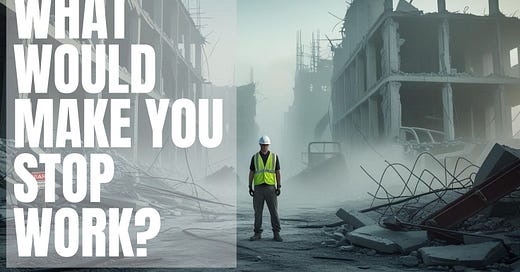What would make you stop work?
Demolition workers toil through risk, pain, disease and tragedy; through wind, rain and snow. Is there ANYTHING that would stop them going to work?
If someone asked you to step into a cage with a Bengal tiger, you’d say no. No hesitation. No debate. Just a flat-out refusal.
If someone told you to square up to a grizzly bear, you’d be gone. No shame, no second thoughts.
If someone suggested you lower yourself into a plague pit, ankle-deep in the bones and bile of past pandemics, you’d probably (and rightly) tell them to piss off.
And yet…
Every morning, you lace up your boots, put on your high-vis, and walk headfirst into dangers most people couldn’t even name, let alone face.
You climb scaffolds where one wrong step comes with no second chance.
You work near equipment that could crush a man flat without even slowing down.
You strip asbestos that can lodge in your lungs and shorten your life.
You breathe in dust, diesel, and fumes; not because you want to, but because the job needs doing, and someone’s got to do it.
And still, you show up.
Even when the world shut down during the COVID-19 pandemic, when the streets were silent and shops were dark, you kept turning up. You were labelled “essential.” A key worker. While everyone else stayed home, fearful, you carried on. Not for applause. Just because it was expected… and because you always have.
But here’s the question no-one really asks you.
What would actually stop you going to work?
Because it wasn’t COVID.
It’s not asbestos.
It’s not the risk of falling from height
It’s not working beside machines that could tear a man in two.
It’s not the funerals.
It’s not the near-misses.
It’s not the long-term injuries you’ve just learned to live with.
And it’s not the suicides that are racking up across the sector.
So where do you draw the line?
Would it be a mate in a body bag?
Would it be a lump in a lung scan?
Would it be a child asking why you’re never home; or why you always come home tired, coughing, angry?
Would it be the morning you woke up and just couldn’t move the way you used to?
Or would you still go in?
That’s the question. And it’s not rhetorical. It’s not soft. It’s not sentimental. It’s real.
Because danger isn’t rare. It’s routine. It’s normal.
And the scariest part? You’ve made peace with it.
The fear that would stop most people in their tracks has become background noise to you.
You walk under suspended loads without a second thought.
You work in contaminated ground like it’s just another day.
You breathe dust because the mask slows you down and the deadline doesn’t care.
And that’s not on you.
That’s the industry. That’s the culture. That’s the way it’s always been.
It shouldn’t be.
And here’s another question; one that never seems to get asked loudly enough:
Is the reward worth the risk?
Because for all the dangers you face, the pay often doesn’t match the price of the sacrifice. Not when you compare it to jobs in air conditioned offices. Not when a missed hazard could mean a lifetime of pain; or no lifetime at all.
They call it “danger money,” but is the money enough to offset the clear and present danger?
You carry the physical toll. The mental weight. The unpredictability. You take the hits so that others can live and work in comfort, drive on smooth roads, sit in shining offices and houses. Yet too often, your value is measured in productivity, not in protection. Your wage reflects the hours, not the hazards. And when things go wrong, the reward never feels enough.
Maybe turning up every day, no matter the risk, shouldn’t be the only way to prove your worth.
Maybe saying, “Not today,” doesn’t mean you’re weak. It means you’ve finally drawn a line.
Because you’ve already proved yourself.
You proved it when you went to work during lockdown.
You proved it when you patched up your own wounds just to finish the shift.
You proved it when you swallowed your pride, your fear, your anger, and just got on with it.
No one can question your courage. No one.
But there’s another kind of strength, too; the kind that knows when to stop.
Knows when enough is enough.
Knows that showing up shouldn’t mean putting your health, your safety, or your future on the line.
Knows that you deserve more than just a pat on the back and a payslip that barely covers the bills.
So again, ask yourself, honestly:
What would stop you going to work?
And if the answer is nothing…
Maybe it’s time to think about why.





